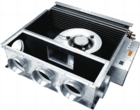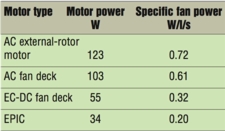The FCU that performs five times better than Building Regulations require

Marking out Advanced Air’s EPIC fan-coil units from others is the use of a centrifugal
fan with an electronically commutated motor to achieve very low specific fan power.
Tables of the performance of fan-coil units for cooling and heating buildings tend to quote airflow, cooling/heating capacity, water flow and noise data. Mention tends not to be made of the power used by motors driving the fans that circulate the air, even though that power could amount to 8% of the cooling capacity of a unit complying with the requirements of the 2006 Building Regulations, falling to 6% in the 2010 regulations.
That electrical power to drive the fans also represents additional cooling load in the space — hence the growing importance attached to minimising specific fan power by the Building Regulations. Specific fan power is a measure of the electrical power required to move air, expressed in W/l/s, and the best performance in the market is claimed by Advanced Air for its EPIC range of fan-coil units.
Mick Holland, the company’s technical products manager, tells us that the best performance achieved with the combination of fan and motor used by Advanced Air, is 0.15 W/l/s — vastly below the 0.8 W/l/s required by current Building Regulations and also well below the 0.6 W/l/s coming up in the next Building Regulations. How this performance compares with other types of fan-coil unit using different types of motor/fan combination is summarised in Table 1.
The longest established technology is the use of AC external-rotor motors, with a separate motor for every fan scroll (first line of the table). It is also the least efficient.
The specific fan power can be reduced to about 0.6 W/l/s by using a single AC motor to drive up to three fan scrolls and made into a fan deck. While that specific fan power would satisfy the requirements of the forthcoming 2010 Building Regulations, Mick Holland tells us that forward-thinking consults are asking for 0.4 W/l/s.
That sort of performance, even a little better, can be achieved by EC-DC (electronically commutated DC) external-rotor motors, with every fan scroll having its own motor and also assembled into a fan deck.
That performance is achieved at a price because, for a while, there was only one manufacturer of EC-DC fan decks, which led to them being relatively expensive. Mick Holland tells us, ‘These fan decks are about double the price of an AC fan deck, and could cost around £260 for a large fan-coil unit.’
Despite the cost, Andrew Sargent, managing director of Advanced Air, says, ‘The market is definitely being driven towards DC, but the payback in terms of energy saved compared with an AC deck is long — two to three years.’
Concerned about the high cost of the most energy-efficient fan decks available and also looking to achieve even better specific fan powers, Advanced Air looked for a different approach — leading to the development of the EPIC range (it stands for electronic pressure-independent control). These fan-coil units use just one centrifugal fan (rather than several scroll fans) directly driven by a electronically commutated motor.
The motors are sourced from the USA, where there are two major suppliers and where costs tend to be lower than equipment made in Europe. The reduction in power required to move the air is significant, as is apparent from the last line of Table 1.

By mounting the centrifugal fan horizontally in the fan-coil unit, only about 10% is added to the height.
This combination of fan and speed-controlled motor brings a host of other benefits. Noise levels are lower, and air volumes can be preset at the factory so units can be delivered fully commissioned. The fan speed can also be controlled in use to further reduce energy consumption, but Mick Holland suggests that air volume should not be reduced below 60% to avoid cold air being dumped from grilles and diffusers.
Using a single motor, as opposed to the multiple motors used in fan decks, is said to increase reliability.
And, of course, the low specific fan power of what Andrew Sargent believes is the most efficient fan-coil unit in the world is a major contributor to lower life-time costs compared with other fan-coil units.
Finally, the payback for an EPIC fan-coil unit compared with one with an AC fan deck is well within a year.
Mick Holland has made a comparison of running costs for the various types of fan-coil unit in a CAV [constant air volume] system. He explains, ‘Consultants prefer CAV to VAV [variable air volume] because they need to be very careful with diffuser selection for a VAV system to avoid air-distribution issues, so we aim to give a good CAV performance. The details are in Table 2, which shows a two-thirds reduction in energy consumption and carbon emissions for an EPIC system compared with AC decks.
Finally, a snippet of good news for readers looking to reduce the energy consumption of existing buildings. An EPIC fan deck can be retrofitted to existing fan-coil units by removing the existing fan deck. The savings made possible will depend on what is removed, but will clearly be greatest if every fan in the existing fan deck has fixed-speed AC motor — added to which will be the energy-saving benefits of variable-speed operation.









